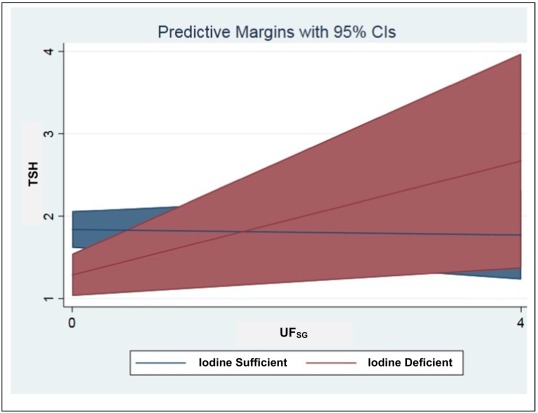Environment International ( IF 10.3 ) Pub Date : 2018-10-10 , DOI: 10.1016/j.envint.2018.09.026 Ashley J. Malin , Julia Riddell , Hugh McCague , Christine Till

|
Background
Fluoride exposure has the potential to disrupt thyroid functioning, though adequate iodine intake may mitigate this effect. This is the first population-based study to examine the impact of chronic low-level fluoride exposure on thyroid function, while considering iodine status. The objective of this study was to determine whether urinary iodine status modifies the effect of fluoride exposure on thyroid stimulating hormone (TSH) levels.
Methods
This cross-sectional study utilized weighted population-based data from Cycle 3 (2012−2013) of the Canadian Health Measures Survey (CHMS). Information was collected via a home interview and a visit to a mobile examination centre. The weighted sample represented 6,914,124 adults in Canada aged 18–79 who were not taking any thyroid-related medication. Urinary fluoride concentrations were measured in spot samples using an ion selective electrode and adjusted for specific gravity (UFSG). Serum TSH levels provided a measure of thyroid function. Multivariable regression analyses examined the relationship between UFSG and TSH, controlling for covariates.
Results
Approximately 17.8% of participants fell in the moderately-to-severely iodine deficient range. The mean (SD) age of the sample was 46.5 (15.6) years and the median UFSG concentration was 0.74 mg/L. Among iodine deficient adults, a 1 mg/L increase in UFSG was associated with a 0.35 mIU/L increase in TSH [95% CI: 0.06, 0.64; p = 0.01, one-tailed].
Conclusions
Adults living in Canada who have moderate-to-severe iodine deficiencies and higher levels of urinary fluoride may be at an increased risk for underactive thyroid gland activity.
中文翻译:

在加拿大居住的成年人中氟暴露和甲状腺功能:碘状态的影响改变
背景
暴露于氟化物有可能破坏甲状腺功能,尽管摄入足够的碘可以减轻这种影响。这是第一项基于人群的研究,旨在研究慢性低水平氟化物暴露对甲状腺功能的影响,同时考虑碘的状况。这项研究的目的是确定尿碘状态是否会改变氟暴露对甲状腺刺激激素(TSH)水平的影响。
方法
这项横断面研究利用了加拿大卫生措施调查(CHMS)第3周期(2012-2013)中基于人口的加权数据。通过家庭访问和访问移动考试中心收集了信息。加权样本代表了加拿大年龄在18-79岁之间未服用任何甲状腺相关药物的6,914,124名成年人。使用离子选择电极测量斑点样品中的尿中氟化物浓度,并根据比重(UF SG)进行调整。血清TSH水平可衡量甲状腺功能。多变量回归分析检查了UF SG和TSH之间的关系,并控制了协变量。
结果
大约17.8%的参与者处于中度至重度碘缺乏症范围内。样品的平均(SD)年龄为46.5(15.6)岁,UF SG浓度中位数为0.74 mg / L。在碘缺乏的成年人中,UF SG升高1 mg / L与TSH升高0.35 mIU / L相关[95%CI:0.06,0.64; p = 0.01,单尾]。
结论
居住在加拿大的成年人中碘缺乏至中度至严重程度,而氟尿酸水平较高,其甲状腺活动不足的风险可能会增加。











































 京公网安备 11010802027423号
京公网安备 11010802027423号